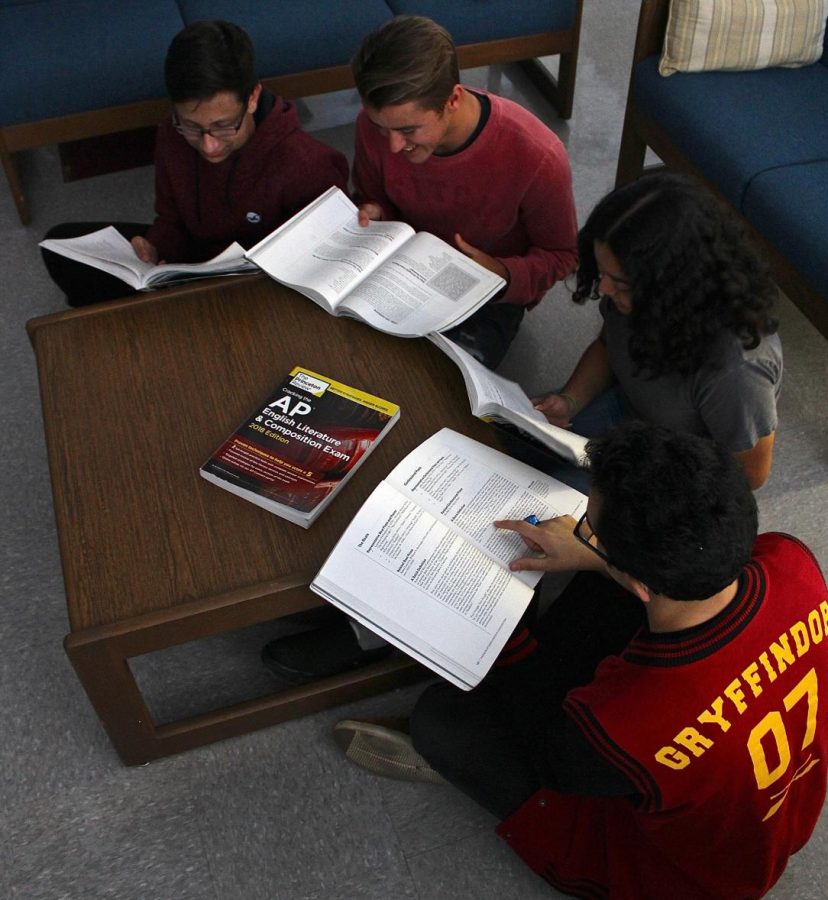Leaked August SAT test may call for canceled scores
In a photo from last year, editors browse through study guides for standardized exams.
August 30, 2018
After spending more than four hours last Saturday taking the SAT, some students felt a little too familiar with this month’s version of the exam.
Hours after students finished College Board’s infamous test, news circulated that the exam had previously been administered in China last October. Questions and answers to that test were posted on a Chinese website and students who used it as practice for the upcoming SATs, noticed the same questions were being reproduced.
Does Collegeboard know that their test book of August SAT is leaked already in China and South Korea way before the test start? Is this fair to the other students? @CollegeBoard #SAT #SATtest pic.twitter.com/qFtm8VauDx
— Qifan Yang (@yang_qifan) August 25, 2018
It’s without a doubt outrageous that the College Board would administer the same October test in such a short period of time. Reusing test material from old exams may be acceptable as long as they range from past years instead of past months. Students don’t usually take the test outside of their junior or senior year of high school, but using the same exam just 10 months apart from each other can raise the possibility of students knowing answers beforehand, therefore giving them an unfair advantage.
After the news broke, students on social media made it clear that they want all the scores canceled, stating that those test takers were at an unfair advantage. However, many seniors who plan on applying early to college may lose their improved scores and would have to settle on their older, not-as-great score.
For those asking, most August SAT scores will be available beginning September 7, as planned. pic.twitter.com/3jNYSsHdTv
— The College Board (@CollegeBoard) August 27, 2018
Plus, identifying students who have cheated is a near impossible task to perform. Though the College Board has stated that they will take action against “those who did not (follow our test security policies),” the organization has zero to no evidence against students with particularly high scores, ending with no action being taken.
There have been too many occurrnces in which students have cheated on the SAT, a test that can make or break a college application. In 2011, 19-year-old Sam Eshaghoff was paid thousands of dollars to take the SAT for six high schoolers. Eshaghoff impersonated these students, one of which was even a female. This incident shows just how low the security levels are.
A 2016 investigation by Reuters found that the College Board’s exams were leaked multiple times and that these exams were still administered a second time. For a company that makes millions of dollars on testing, creating new tests shouldn’t be a problem, granted that they’re paid to do this. Reusing tests that have been compromised not only makes them unreliable, but gives students an unfair advantage when applying to college.










Rachel Bullock • Sep 1, 2018 at 6:17 pm
^^ I didn’t take that photo, Richard did!!
Also, interesting story!! I didn’t know that this happened. : (
Though I do think it was an unfair advantage for those who studied from the previous test, they studied all the same and no one could have known it’d be that similar.
Besides, cancelling scores for everyone would be an extreme measure affecting hundreds of thousands who took the exam just to put those who knew on the same page as everyone else.
It’s a tough situation, really.
Regardless, best of luck to all the wonderful and brilliant students taking their SATs and ACTs this year. ^_^ Go Sharks!!